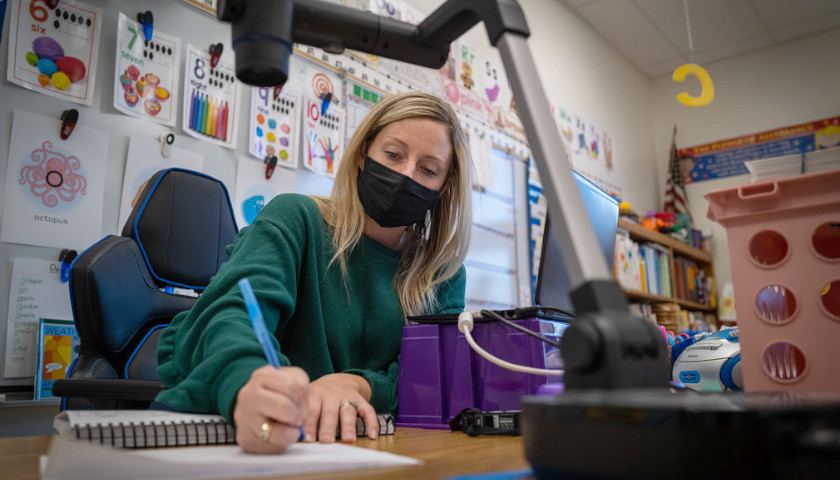Elementary and high schools throughout the country this week are having children participate in Black Lives Matter at School’s “Week of Action,” using lesson plan “resources” based on the activist organization’s core principles that seek to disrupt Western family structure, and teach children to affirm the “transgender” and “queer” lifestyles.
Join us for our #BLM Week of Action Virtual Symposium celebrating Black Children. For more information: https://t.co/KuQs1PXli8#dekalbschoolsblm pic.twitter.com/KcQbYOdwLx
— DeKalb Schools, GA (@DeKalbSchools) February 2, 2022
Black Lives Matter (BLM) at School has provided a toolkit for schools and teachers with a curriculum that features a movie for different grade bands matched to “the 13 guiding principles of the BLM movement.”
The project also provides a discussion guide “to help educators facilitate critical conversations connecting the media they’ve engaged with to the movement.”
For example, the curriculum for grade band K-1 recommends five-six-year-old children watch the Disney Pixar movie Soul, followed by a discussion about the BLM principle of “Black villages.”
BLM at School seeks to have children view black families as being “free from patriarchal practices,” or, in other words, “fathers.”
The organization replaces the Western view of “families,” which includes a father and a mother together raising their children, with the concept of “villages.”
“Black Villages is the disruption of Western nuclear family dynamics and a return to the ‘collective village’ that takes care of each other,” the organization asserts.
The Soul discussion guide makes the suggestion to young children that people outside their family may be their primary supporters and caretakers.
The guide recommends children discuss, in relation to the movie:
- “Were there people in Joe’s community that helped him?”
- “Who in your community helps you feel loved and proud?”
- “Can you have people in your family that aren’t related to you by blood?”
It's "BLM at School Week" again. Is your district using BLM's 13 guiding principles to teach elementary school students to be "queer-affirming" and work towards disrupting the western nuclear family?
Here is what some districts (and unions) are doing. https://t.co/kZqvLW5q3c
— Parents Defending Education (@DefendingEd) February 1, 2022
High school students may watch the movie Moonlight, about a young black man who is “guided by the kindness, support and love of the community that helps raise him.”
According to BLM at School, the film explores “LGBTQIA+ youth experience when coming of age while also surviving poverty, homophobia, and broken adults (those struggling with addiction, mental health challenges and expected ‘social norms’).”
The organization ultimately hopes students will commit to its principles of being transgender- and queer-affirming.
“Everybody has the right to choose their own gender by listening to their own heart and mind,” BLM at School teaches. “Everyone gets to choose if they are a girl or a boy or both or neither or something else, and no one else gets to choose for them.”
The organization also teaches students its ultimate goal is to have no boundaries in sexuality, i.e., to work toward a “queer-affirming network where heteronormative thinking no longer exists.”
Throughout most of the grade levels, BLM at School also teaches the principle of “restorative justice,” a concept pushed by the Obama administration with the claim schools that suspend black and other minority students for unacceptable behavior are acting out of systemic racism.
BLM at School defines its “restorative justice” principle as “the commitment to build a beloved and loving community that is sustainable and growing.”
“We know that if you knock down someone’s block building, you have to help them rebuild it, you can’t just say, ‘Sorry,’ and walk away,” the organization states. “Another way to say that is restorative justice, and it’s the idea that we have to help people when something happens to them, even if it was by accident.”
The late professor of economics Walter Williams summarized restorative justice as follows in March 2017:
Rather than punish a student through exclusion (suspension), restorative justice encourages the student who has misbehaved to reflect on his behavior, take responsibility and resolve to behave better in the future. The results of this new policy are: increased violence, drug use and gang activity.
The DeKalb County School District in Georgia is participating in BLM at School this week.
Day two of our Black Lives Matter Week of Action celebrates Black-owned businesses and Black business leaders. What are three DeKalb Black-owned businesses that you support? #BlackBusinessesMatter #SupportBlackBusinesses #dekalbschoolsblm pic.twitter.com/fWLE90fSg8
— DeKalb Schools, GA (@DeKalbSchools) February 1, 2022
National grassroots organization Parents Defending Education (PDE) reported extensively about DeKalb’s “Week of Action.”
Schools & school districts across the country are participating, including schools in Colorado, Georgia, Illinois, Kentucky, Massachusetts, New York, Pennsylvania, Vermont, Washington, & Wisconsin, according to a list compiled by [@DefendingEd]https://t.co/T1YLTE13Zn
— Parents Defending Education (@DefendingEd) February 1, 2022
“It’s our responsibility as educators to create safe spaces for children to speak about issues that are important to them,” Superintendent Cheryl Watson-Harris said about the week, according to the Atlanta Journal-Constitution (AJC) Monday. “That I do not believe is in conflict with any of the other larger political conversations.”
AJC’s article minimized the content of the BLM at School curriculum with comments suggesting students would simply be talking “about race,” while “state Republican lawmakers … want to limit those discussions.”
The National Education Association (NEA), the nation’s largest teachers’ union, is promoting Black Lives Matter at School.
As @beckypringle says: Black lives matter at school. Your voice matters, your trauma matters, your dreams matter. Join us in the movement for education justice this week and beyond. #BlackLivesMatteratSchool pic.twitter.com/OUPC6DMHVQ
— NEA (@NEAToday) February 1, 2022
“Most rational thinkers agree that public schools should not be home to political activism, from any side of the political divide, but public schools across America, from Boston to Seattle, have opened their doors for activist teachings from the divisive Black Lives Matter political organization,” PDE Vice President of Investigations Asra Nomani said in a statement reported by Fox News.
“Under the cover of a week of action, called ‘Black Lives Matter at School,’ children as young as five years old are being trained how to be political activists,” she continued. “What we are witnessing is state-sponsored political indoctrination, using coloring books, downloadable slide shows and contests to teach a next generation ‘social justice activism,’ in the program’s own words.”
– – –
Susan Berry, PhD is national education editor at The Star News Network. Email tips to [email protected].
Photo “Teacher Teaching” by Phil Roeder. CC BY 2.0.





